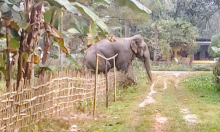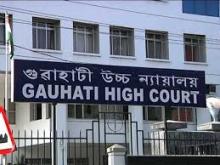Post-Independence era in the history of Assam is full of public grievances and agitations for existence and identity. Assam agitation against the foreigners' infiltration into the state was the major among many, which rocked the whole nation beyond expectations. The deep rooted policy of British Administration followed by the Muslim League ministry under the premiership of Sir Saidullah was the main cause of turmoil in Assam. The tea gardens in Assam were under the control of foreigners and the Muslim League ministry formed in1936, was following a communal and anti-people policy in the interest of tea garden owners.
In the State Assembly, Gopi Nath Bordoloi was the leader of Opposition. He became 'Lokapriya' for his sympathetic attitude towards all sections of the society. It was with his efforts that Khasi, Jayantia, Garo and Mikir Hills were included in the Sixth Schedule of the Constitution of India and attained the status of autonomous districts. But Lokapriya did not get much time to build up the state according to his dreams and passed away in the year 1950.
The Congress Party ruled over the State continuously for thirty years, but after Bordoloi, none of the leaders looked into the interest of the people, rather some of them worked against the people's desire. In the year 1977, Congress was thrown out of power for the first time. The State politics took a dramatic turn during the Assembly elections in February 1978. Newly formed Janata Dal got 53 seats out of 126 in the State Assembly. The Communist Party of India-Marxist captured 11 seats. Taking support from the various Non-Congress parties and CPI-M, JD leader Golap Borbora formed the first ever Non-Congress ministry in Assam.
In July 1978, All Assam Students Union (ASSU) raised a 16-point demand, prominent among them were detection, deletion and deportation of foreign nationals from the state. It was alleged that the Non-Congress government came into power on the basis of the votes of these foreign nationals and the Communists helped them in this matter. With consolidation of regional forces as AASU, Asom Jatiyatabadi Dal, Purbanchaliya Lok Parishad, Yuva Chhatra Parishad, Assam Yuva Samaj, Young Lawyers Forum etc; a new organisation was formed under the banner of All Assam Gana Sangram Parishad (AAGSP). The presence of foreign nationals in the State was the burning issue before the state. Afterwards, this very issue rocked the entire northeastern region.
In the centre stage of the issue was the electoral rolls revision of Mangaldoi Parliamentary Constituency in Darrang district, before 1979 Lok Sabha elections, where seventy thousand foreigners' presence was alleged. On the scrutiny of the complaints the Election Commission found 64 percent complaints as genuine. The people of the state were astonished at this sort of affairs. The question was, if in one constituency the number of foreigners was that much, what would be the position in other 13 parliamentary constituencies? Atmosphere of mistrust prevailed throughout the state. In the beginning the voice was raised against the presence of outsiders, subsequently the issue turned against the foreigners. There was also a controversial debate on these two words. A large number of people from other states of the country were terribly afraid when the finger was raised against them. It may be mentioned in this context that a large number of non-Assamese people in the state have major role in administration, educat on, tea garden and industry sectors. Out of fear most of them started winding up and state economy was badly affected. Many important industries collapsed and serious unemployment problem raised its head.
Seriousness of foreigners' influx in the state cannot be ruled out. At the time of country's partition in 1947 the rehabilitation of refugees had already changed the population graph. Again in 1971, when Bangladesh came into existence, the influx of Bangladeshi nationals deepened the crisis. Assamese people were scared of being turned into minority in their own state. The Assam agitation was the only way to save their identity and existence. Census Report of Assam 1981 could not be published because of the continued agitation. It was realized that after creation of Bangladesh a large number of citizens recorded their mother tongue as Bengali, though some of them had already mentioned it as Assamese in the past.
On 15 August 1985, Assam Accord was signed at New Delhi between the Government of Assam, Centre and agitation leaders in presence of erstwhile Prime Minister Rajiv Gandhi. With the result of this Accord a new political party, namely, Asom Gana Parishad was formed, which came to power. But it could not solve the burning problems of the state. It completed its full term, but not a single foreigner was detected. They had to lose the next election to Congress. The Congress also completed full term, but no solution to any problem was achieved. AGP and the Congress remained the main rivals since then and they ruled the state alternatively without any fruitful result. The ruling parties are accused of being involved in rampant corruption. The people of the state are in a fix on the matter whosoever comes to power does nothing to implement the Assam Accord although twenty seven years have passed.
In the State Assembly, Gopi Nath Bordoloi was the leader of Opposition. He became 'Lokapriya' for his sympathetic attitude towards all sections of the society. It was with his efforts that Khasi, Jayantia, Garo and Mikir Hills were included in the Sixth Schedule of the Constitution of India and attained the status of autonomous districts. But Lokapriya did not get much time to build up the state according to his dreams and passed away in the year 1950.
The Congress Party ruled over the State continuously for thirty years, but after Bordoloi, none of the leaders looked into the interest of the people, rather some of them worked against the people's desire. In the year 1977, Congress was thrown out of power for the first time. The State politics took a dramatic turn during the Assembly elections in February 1978. Newly formed Janata Dal got 53 seats out of 126 in the State Assembly. The Communist Party of India-Marxist captured 11 seats. Taking support from the various Non-Congress parties and CPI-M, JD leader Golap Borbora formed the first ever Non-Congress ministry in Assam.
In July 1978, All Assam Students Union (ASSU) raised a 16-point demand, prominent among them were detection, deletion and deportation of foreign nationals from the state. It was alleged that the Non-Congress government came into power on the basis of the votes of these foreign nationals and the Communists helped them in this matter. With consolidation of regional forces as AASU, Asom Jatiyatabadi Dal, Purbanchaliya Lok Parishad, Yuva Chhatra Parishad, Assam Yuva Samaj, Young Lawyers Forum etc; a new organisation was formed under the banner of All Assam Gana Sangram Parishad (AAGSP). The presence of foreign nationals in the State was the burning issue before the state. Afterwards, this very issue rocked the entire northeastern region.
In the centre stage of the issue was the electoral rolls revision of Mangaldoi Parliamentary Constituency in Darrang district, before 1979 Lok Sabha elections, where seventy thousand foreigners' presence was alleged. On the scrutiny of the complaints the Election Commission found 64 percent complaints as genuine. The people of the state were astonished at this sort of affairs. The question was, if in one constituency the number of foreigners was that much, what would be the position in other 13 parliamentary constituencies? Atmosphere of mistrust prevailed throughout the state. In the beginning the voice was raised against the presence of outsiders, subsequently the issue turned against the foreigners. There was also a controversial debate on these two words. A large number of people from other states of the country were terribly afraid when the finger was raised against them. It may be mentioned in this context that a large number of non-Assamese people in the state have major role in administration, educat on, tea garden and industry sectors. Out of fear most of them started winding up and state economy was badly affected. Many important industries collapsed and serious unemployment problem raised its head.
Seriousness of foreigners' influx in the state cannot be ruled out. At the time of country's partition in 1947 the rehabilitation of refugees had already changed the population graph. Again in 1971, when Bangladesh came into existence, the influx of Bangladeshi nationals deepened the crisis. Assamese people were scared of being turned into minority in their own state. The Assam agitation was the only way to save their identity and existence. Census Report of Assam 1981 could not be published because of the continued agitation. It was realized that after creation of Bangladesh a large number of citizens recorded their mother tongue as Bengali, though some of them had already mentioned it as Assamese in the past.
On 15 August 1985, Assam Accord was signed at New Delhi between the Government of Assam, Centre and agitation leaders in presence of erstwhile Prime Minister Rajiv Gandhi. With the result of this Accord a new political party, namely, Asom Gana Parishad was formed, which came to power. But it could not solve the burning problems of the state. It completed its full term, but not a single foreigner was detected. They had to lose the next election to Congress. The Congress also completed full term, but no solution to any problem was achieved. AGP and the Congress remained the main rivals since then and they ruled the state alternatively without any fruitful result. The ruling parties are accused of being involved in rampant corruption. The people of the state are in a fix on the matter whosoever comes to power does nothing to implement the Assam Accord although twenty seven years have passed.






Add new comment